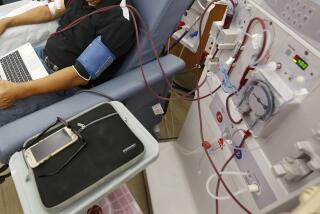House Bill Promotes Living Donor Plans
- Share via
WASHINGTON — Hoping to encourage living Americans to donate a kidney or even a section of liver, the House voted unanimously on Wednesday to help pay donors’ travel and other expenses.
Living donations doubled during the 1990s as medical techniques improved and the demand for organs became more acute, while donations after death grew very slowly.
“It’s a very simple, direct kind of program. If you’re willing to help and you’re willing to donate, we’re going to help you,” said Rep. Karen Thurman, D-Fla.
The legislation, approved 404-0, with 31 members absent, also provides for grants to states to try to increase donations after death.
The debate and vote were in stark contrast to the last time the House considered the issue of organ donation, when lawmakers were sharply divided over how available organs should be distributed.
Most members supported the current system, which gives preference to patients in the local areas; others argued that organs should be offered to the sickest patients first, even if they live outside the area. That debate is largely on hold, and much of the attention has turned to donation, where there is a consensus. The legislation approved Wednesday pulled out the noncontroversial aspects of the 1999 House bill.
The legislation authorizes $5 million per year for grants to states and organ banks to reimburse travel and other expenses for certain living donors. It also allows for $15 million for grants that would help states develop registries of people who wish to donate and for public education about donation. That money still must be appropriated through the annual budget process.
Health and Human Services Secretary Tommy Thompson, who has promised to offer his own program promoting organ donation, said in a letter that the Bush administration supports the legislation.
It now heads to the Senate, where Sen. Richard Durbin, D-Ill., is working on a similar bill that would put more emphasis on encouraging donor registries.
Federal law prohibits paying for organs, and an effort in Pennsylvania to reimburse donor families for their funeral expenses was scuttled amid legal concerns.
The House bill takes a similar approach, and both efforts represent small steps toward paying for organs, said Arthur Caplan, director of the Center for Bioethics at the University of Pennsylvania. But both are ethically sound, he said.
“We should all be concerned that we not slide for paying for expenses to just paying people for their parts,” he said. But he said there is nothing wrong with helping people who make this choice on their own. “We want people to be heroes, but we don’t want them to be martyrs,” Caplan said.
While some contend government should pay for organs, given their incredible value, Caplan and others worry that could erode support for donation and create situations in which people are pressured to donate against their wishes.
More than 74,000 people await transplants, and more than 6,100 die each year waiting. The number waiting and the number of deaths have each more than tripled since 1990.
Most donations come from people who have died. But in 1999, there were 4,712 living organ donors. Most of them donated one of their two kidneys, though donations of a piece of liver are becoming more common, with 218 in 1999.
Only one kidney is needed for normal function, and the two pieces of a divided liver can each regenerate to become full livers. Under the national transplant network’s rules, kidney donors who see their remaining kidney fail are given preference on the waiting list.
Of the living donors, most are family members, principally siblings. Twenty percent came from people unrelated to the recipient in 1999.
The bill would allow states to pay donors for travel and subsistence expenses if the donor and the recipient live in different states and if the recipient has surgery at the closest transplant center. Those who donate organs to patients with annual incomes over $35,000 would not be eligible.
More to Read
Sign up for Essential California
The most important California stories and recommendations in your inbox every morning.
You may occasionally receive promotional content from the Los Angeles Times.













